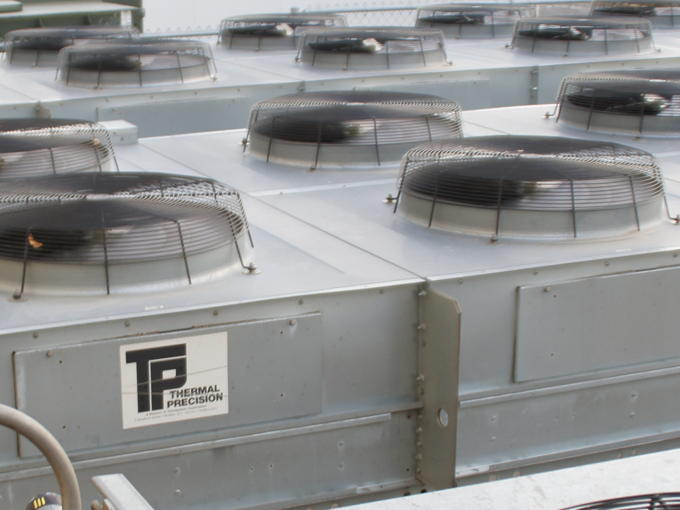6 Benefits of a Closed-Loop Air Compressor Cooling System
During daily operation, air compressors generate a lot of heat that can damage nearby equipment, injure employees and have a negative impact on finished products. For water cooled compressor installations, an air compressor cooling system is an essential component because it removes excess heat to ensure consistent, safe and efficient air compressor performance. When selecting an air compressor cooling system, the options include open compressor cooling systems or closed-loop cooling systems. This blog will compare the two and discuss the benefits of closed-loop cooling systems.
Why Do I Need an Air Compressor Cooling System?

During normal operation, industrial air compressors can reach temperatures as high as 200°F or more, which can be hazardous to employees, cause damage to equipment and interfere with product integrity.
If an air compressor cooling system is not functioning properly, the hot air flow may result in the following:
- Increased temperatures in the compressor room and strained HVAC systems
- Burns or other injuries to employees
- Moisture build up and condensation in the air compression system that can damage finished products
- Overheated air compressors
- Excessive degradation of internal compressor components
- Degraded seals and lubricants and component failure in downstream equipment
Fortunately, air compressor cooling systems can help minimize these hazards, making the facility a safer place, while ensuring the integrity of finished products, as well as the efficiency and longevity of the air compression system.
What is an Air Compressor Cooling System?
Now that you know why you need one, we’ll explain the basic operating principle of compressor cooling systems. Air compressor cooling systems are engineered to remove the excess heat generated during the normal air compression process and expel the cooled air in a safe way. Water cooled air compressors may include items such as water-cooled aftercoolers and oil coolers which serve as heat exchangers in that they use a circulating liquid (usually water, glycol or a glycol/water mixture) to absorb the heat from the compression process. As the compressed air or oil moves through the coils, water circulates around the coils, removing the excess heat.
Water- or liquid-cooled compressor cooling systems tend to be better suited to high-volume, high-pressure industrial applications than air-cooled options because they offer greater cooling capacity and efficiency, so this blog will focus on water-cooled air compressor cooling systems.
There are three types of water-cooled compressor cooling systems:
| Closed-loop water cooling systems | In a closed-loop cooling system, water or a coolant fluid such as a water/glycol mixture is circulated continuously as it passes through a heat exchanger that absorbs the heat that is generated by the compression process. The heated coolant is then circulated to a separate cooling unit such as a drycooler, which can be supplemented with a trim cooler to assist during the hottest days of the year, or an evaporative cooling tower, to be cooled back down before it is recirculated back to the compressor to continue the cooling cycle. The cooling unit then expels the absorbed heat in a safe way. Closed-loop liquid cooling or closed-loop water cooling systems are also called recirculating systems because they use the same water or coolant fluid throughout the system and rely on heat exchange to cool the water down before the cooling process resumes. |
| Open tower compressor cooling systems | In an open tower compressor cooling system with a circulating water supply, an open cooling tower is used to cool the water from the compressor. Water is cooled in the cooling tower as it trickles down into a chamber through which air is blown. As air blows through this chamber, some of the water evaporates and the remaining water is cooled to below ambient temperature. |
| Open compressor cooling system without recirculating water | This type of compressor cooling system requires an external water source, such as municipal water, well water or lakes, which must be filtered and purified so contaminants do not damage the compressor or cooling system. After passing through the compressor, the water is discharged as wastewater. Open systems without recirculating water require controls to maintain the air temperature and regulate water usage. |
The Benefits of Closed-Loop Water Cooling Systems
Because a closed-loop cooling system isolates the cooling fluid from external contaminants and recirculates the cooling water or fluid, it does not require use of an open cooling tower, well or municipal water supply and is not as likely to cause contamination issues in the air compression system, making them an advantageous compressor cooling option.
Here are 6 benefits of using a closed-loop cooling system:
- Less maintenance: Because they are not open to contaminants that may collect in an open cooling tower or from an external water source, closed-loop water cooling systems do not introduce debris or other contaminants into the system, reducing the amount of filtration and maintenance that may be needed with open-loop systems.
- Sustainability: Because they do not require a cooling tower for operation, closed-loop liquid cooling systems do not use as much water as open systems, making them a more sustainable solution. In addition, cooling tower operation often requires the use of costly water treatment chemicals and wastewater disposal measures.
- Freeze protection: In closed-loop liquid cooling system installations, glycol or glycol water mixtures may be used to prevent freezing in colder locations.
- Optimized performance: Closed-loop cooling systems are capable of maintaining consistent temperatures and keeping compressed air moisture and condensation levels to a minimum, ensuring better performance from the air compression system and point-of-use equipment.
- Limited water requirements: Closed-loop water cooling systems are a great choice when the availability of cooling water is limited.
- Reduced costs: Because closed-loop cooling systems use less water, there are lower utility bills and fewer water treatment and disposal expenses. Minimal maintenance and filtration requirements assist in the reduction of operating expenses, as well.
To learn more about how a closed-loop liquid cooling system for compressor cooling can benefit your bottom line and safeguard product integrity while making your facility a safer and more sustainable workplace, please contact the air compression experts at JHFOSTER, a Tavoron company.
